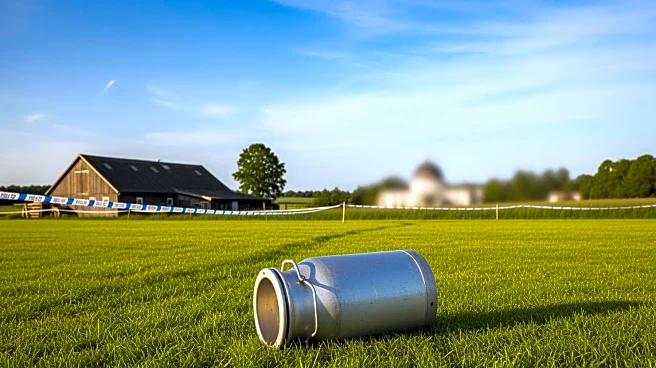What's Happening?
Danish dairy farmers are reporting adverse effects on their cattle following the implementation of a new climate policy aimed at reducing greenhouse gas emissions. The policy involves the use of synthetic
additives in cow feed, specifically a compound called Bovaer, which is intended to reduce methane emissions from cattle. However, farmers have observed a decline in milk production, with some cows collapsing and requiring euthanasia due to severe health issues. The policy is part of Denmark's broader climate goals, which include achieving climate neutrality by 2050 and reducing emissions by 70% by 2030 compared to 1990 levels.
Why It's Important?
The situation highlights the challenges of balancing environmental goals with agricultural practices. While the policy aims to reduce methane emissions, a significant contributor to climate change, the reported health issues among cattle raise concerns about the sustainability and safety of such measures. The impact on dairy production could have economic repercussions for farmers, affecting their livelihoods and the dairy industry as a whole. Additionally, the case underscores the need for thorough evaluation and testing of environmental policies to ensure they do not inadvertently harm the sectors they aim to improve.
What's Next?
In response to the reported issues, stakeholders may seek to review and adjust the policy to address the health concerns of cattle. This could involve further research into the effects of Bovaer and exploring alternative methods for reducing emissions. The Danish government and agricultural organizations are likely to engage in discussions to find a balanced approach that supports both environmental objectives and the well-being of livestock. Monitoring and feedback from farmers will be crucial in guiding future policy decisions.
Beyond the Headlines
The development raises ethical questions about the use of synthetic additives in animal feed and the potential consequences for animal welfare. It also highlights the broader debate on the role of agriculture in climate change mitigation and the need for innovative solutions that do not compromise animal health. The situation may prompt further exploration of sustainable agricultural practices and the integration of technology in achieving climate goals.










